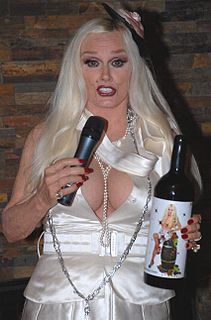A Quote by Melissa Gira Grant
What shocked me was three different anti-prostitution feminists asking me to justify that I had been a sex worker, to prove it. That either I hadn't done enough sex work by their standards, or I hadn't done the right kind in order to have the right to speak about it. I couldn't understand them. I'm not speaking for you. I'm not speaking "for" anyone. I'm trying to put together this picture of the different forces that are producing a result in the lives of sex workers. You can't contest the fact that tons of people are going to jail and experiencing violence.
Quote Topics
About
Anti
Anyone
Asking
Been
Contest
Different
Done
Either
Enough
Experiencing
Fact
Feminists
Forces
Going
Had
Jail
Justify
Kind
Lives
Me
Order
People
Picture
Producing
Prostitution
Prove
Prove It
Put
Result
Right
Sex
Sex Work
Shocked
Speak
Speaking
Standards
Them
Three
Together
Tons
Trying
Understand
Violence
Work
Worker
Workers
Related Quotes
I've moved away from writing about and describing actual experiences of sex work, whether mine or anybody else's, because the culture is obsessed with the behavior of sex workers. They want to figure out why they do what they do and who they are. What I'm trying to do is to shift the focus onto the producers of the anti-sex work discourse: the cops, the feminists, the anti-prostitution people. Those are the people whose behavior needs to change.
Sex workers are the last women police stand in to protect. Sex workers are the last people that room is made for in many ways. You get a different kind of feminism if you put people at the margins at the center. It's a recently resonant lesson, but black feminists have been saying this for decades. Now when I talk to people engaged in sex workers' rights advocacy and people who identify as intersectional feminists, this is the air they breathe. We can't just make feminism about improving the lives of all women. Because there is no such thing as all women and universal female experience.
I hesitate talking about a program for change because we're in this moment where no one is listening to sex workers about how things should change. So I'm even speaking less as a former sex worker and more as a person trying to see the bigger picture that might be hard to see when you're doing sex work full-time, or running a social service organization, or doing all the things that a lot of sex worker activists are doing. It's hard work, and they don't necessarily get the time to step back and see the whole picture.
I think sex work gets over-mystified and overcomplicated because it's about sexuality, and women's sexuality in general. What strikes me when I look at sex worker organizations and sex worker movements, in the US especially, is that they're so in alignment with other longstanding progressive causes. If anything, sex workers have been at the forefront of some of these causes. There have always been sex workers at the forefront of social movements.
I respect people who come forward and speak, but I'm not asking most of the sex workers I interview now about their work. I'm asking them about their lives in general or their political organizing. I take pains source things pointing back to intellectual work that sex workers have produced, because that's really absent.
I think the anti-prostitution feminists need to do some consciousness-raising amongst themselves about their feelings. But that's a different political activity. Asking ourselves, how do we feel about the fact that our boyfriends, our husbands, our male partners might hire sex workers? They should have that conversation, but they shouldn't attach it to policy conversations that affect people.
In your thirties, you're much more comfortable with sex. First of all, sex is something you've done more. You know you can have sex just to have sex; you can have sex with friends; you can have sex with people you love; you can have sex with people you don't like, but the sex is good. And you can joke about sex much more.
I think a lot of people trying to follow Buddhism these days are getting confused about sex and they don't understand what's going on. They've been exposed to a contemporary Christian idea that sex itself is evil and bad, which I'm not so sure was Jesus' idea. For me, the Buddhist approach isn't that sex itself is evil or bad but that sex is neutral. It's the way you do it that can problematic.
Most of the time, people are not actually concerned with prostitution and sex work. They're concerned about seeing people who they think are prostitutes and sex workers in their community. Sometimes this just comes down to profiling, the feeling of "I don't want someone who looks like that in my neighborhood." We need communities and neighbors to regard sex workers as part of the community and fellow neighbors. But that's really difficult. There's certainly nothing supporting that.
I was groomed as a so-called sex symbol, a rival to Marilyn Monroe, and from then on, whenever my picture appeared in paper, it was 'sex kitten,' 'sex symbol,' 'sex goddess,' 'sex pot.' I've accepted it, and I'm flattered, but in some ways, it's been a hindrance to me because I haven't been able to be taken seriously as an actress.
Sex is hard to write about because you lose the universal and succumb to the particular. We all have our different favorites. Good sex is impossible to write about. Lawrence and Updike have given it their all, and the result is still uneasy and unsure. It may be that good sex is something fiction just can't do - like dreams. Most of the sex in my novels is absolutely disastrous. Sex can be funny, but not very sexy.

























